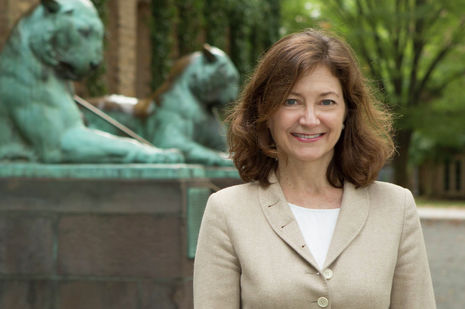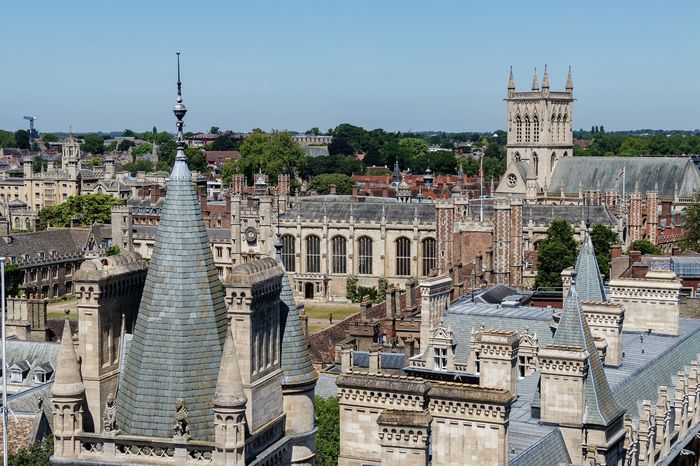University names American academic as next vice-chancellor
Deborah Prentice, the provost of Princeton University, has been chosen as the long term successor to Stephen Toope

The provost of Princeton University has been nominated by the University Council to be the next vice-chancellor of Cambridge.
Professor Deborah Prentice, who has led Princeton since 2017, will assume the role in July next year, assuming the nomination is approved by the Regent House, a governing body.
If approved, Prentice, who took her undergraduate degree at Stanford University in California, will become the first American to hold the role.
Prentice takes over one of the biggest jobs in higher education at a time when UK universities are facing difficulties with funding and increasing regulation post Brexit.
Prentice’s academic work has focussed on the study of social norms, and she has published extensively on the topic, writing at length about alcohol abuse, domestic violence and gender stereotypes.
Prentice said: “It is a huge honour to be nominated to lead such a renowned institution. I welcome the challenge of helping Cambridge write the next chapter of its long and proud history.
“Higher education around the world faces many challenges but I firmly believe there are also great opportunities to demonstrate how our leading universities can together harness their expertise to solve global problems. I hope that I can play some part in leading that dialogue.”
Toope announced last year that he would be leaving his post two years early. He was due to complete his seven-year term in October 2024.
He said: “As I step down as Vice-Chancellor, I am delighted to know the University is appointing a successor of such academic distinction, and with an experience of leadership at all levels of university life that will stand her in good stead at Cambridge.
“I am confident that Professor Prentice will bring fresh perspectives and new ideas to Cambridge, and I look forward to seeing our world-leading university continue to flourish under her guidance.”
The outgoing vice-chancellor’s tenure was not uncontroversial, prompting some to speculate that he chose to step down early due to negative press coverage, especially in the right-wing media.
His time in office was particularly marked by debates over free speech at the University, with the outgoing vice-chancellor being criticised by some for not doing enough to promote academic freedom.
When his resignation was announced, one academic told The Times: “I am delighted that Toope is going, since one could scarcely imagine a worse vice-chancellor.”
If Prentice is to avoid a similar fate she will have to tread a delicate path, appeasing divided academics, students, and the press to avoid the kind of internal dissent and external criticism that plagued her predecessor.
She will have some advantages compared to Toope. The pandemic is now all but over, freeing her to focus on other problems. Feeling around China is still strong, but that strength of opinion has partly resolved the problem, as University institutions quietly distance themselves from the regime.
Notably, the new master of Jesus College, Sonita Alleyne, oversaw significant reform of the College’s controversial China Centre earlier this year, intended to address concerns about academic freedom and the funding of research by a potentially hostile foreign power.
Nonetheless, Prentice will face some substantial challenges when she takes over from Toope. The economic situation is unpredictable, but it is entirely possible that the cost of living crisis is still biting in April.
More generally, funding is an issue many British universities are struggling with, as tuition fees remain frozen and so decline in real terms each year. Simultaneously, faced with a difficult economic climate, and still plagued in places by online learning, prospective students may be questioning whether getting a degree is worth the debt.
Cambridge is largely insulated from these problems by its wealth and prestige, but neglecting them still carries risk. In order to attract the very best students, the University needs the largest possible pool of applicants. Even if students aren’t put off applying, a sense that they’re not getting their money’s worth once they arrive in Cambridge could create problems for the new vice-chancellor.
Meanwhile, much funding for research, and the international co-operation that supports the University’s academic work, has been jeopardised by the UK’s exit from the EU, which has already cut it off from the Erasmus student exchange programme. UK access to the flagship Horizon Europe research programme has also been thrown into doubt.
She may also have to deal with government interference, including a proposal by Liz Truss during the Tory leadership race that every Oxbridge applicant receiving three A*s should be interviewed.
The plan has not been mentioned since Truss became prime minister, but still reflects the strength of feeling caused by debates around widening participation at Oxbridge, something Prentice will have to face.
Relatedly, she will have to address the increasing number of UK students choosing elite US universities — like the one Prentice currently runs — over Oxbridge, a trend being driven in part by students from more affluent backgrounds who say they feel put off Oxford and Cambridge by unwelcoming rhetoric.
The other potential vice-chancellors thought to be under consideration were Katherine Willis, the principal of St Edmund Hall in Oxford and Deborah Coen, a professor of history at Yale University.
Anthony Freeling, the outgoing president of Hughes Hall, will serve as acting vice-chancellor between Toope's resignation and Prentice's appointment, assuming it is confirmed.
 Interviews / Lord Leggatt on becoming a Supreme Court Justice21 January 2026
Interviews / Lord Leggatt on becoming a Supreme Court Justice21 January 2026 Features / Are you more yourself at Cambridge or away from it? 27 January 2026
Features / Are you more yourself at Cambridge or away from it? 27 January 2026 News / Reform candidate retracts claim of being Cambridge alum 26 January 2026
News / Reform candidate retracts claim of being Cambridge alum 26 January 2026 News / Report suggests Cambridge the hardest place to get a first in the country23 January 2026
News / Report suggests Cambridge the hardest place to get a first in the country23 January 2026 News / Cambridge psychologist to co-lead study on the impact of social media on adolescent mental health26 January 2026
News / Cambridge psychologist to co-lead study on the impact of social media on adolescent mental health26 January 2026











